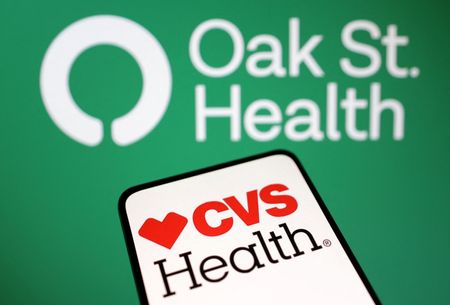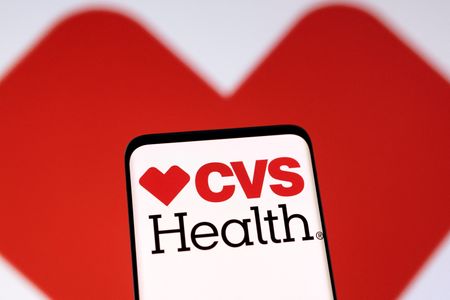By Bhanvi Satija and Raghav Mahobe
(Reuters) -CVS Health Corp will buy Oak Street Health Inc for about $9.5 billion in cash, joining rivals in adding primary care to its portfolio as pressure mounts on its health insurance business.
Oak Street is losing money and not expected to contribute to CVS earnings for years, but analysts said the deal is strategically sound and shares of the multi-business company were up 4.5%.
The deal – CVS’ third largest in the last decade – echoes moves by rivals Walgreens Boots Alliance, Cigna Corp and UnitedHealth Group Inc as a focus on primary and urgent care delivery has increased since the COVID-19 pandemic.
CVS Health, among the nation’s largest pharmacy chains, pharmacy benefit managers (PBMs) and health insurers with its Aetna unit, had been in the market for a medical services acquisition since last year. The Oak Street deal will add over 160 primary care centers that offer routine health screening and diagnosis to older adults.
CVS Chief Executive Karen Lynch said with the acquisition, the company could start to refer customers it reaches in home health assessments to Oak Street for care and ease their ability to get the prescriptions they need, from CVS pharmacies.
Some of those Oak Street patients are already members of Aetna Medicare Advantage plans and the company can make new products as well, she said.
“30 million Americans depend on Medicare Advantage…and it is proven to save costs,” Lynch said.
CVS said it plans to nearly double the business to 300 clinics by 2026.
The company also aims to grow the number of Oak Street patients over time and improve its retention of Aetna Medicare Advantage patients who seek care at Oak Street clinics.
“We believe the platform makes strategic sense,” said RBC analyst Ben Hendrix, noting that Oak Street operates clinics in U.S. states that have about two-thirds of Aetna’s Medicare Advantage membership.
The company also expects the deal to drive customers to its CVS pharmacies and PBM business.
The deal comes as CVS faces challenges from lower ratings on its Medicare Advantage insurance plans and the end of a major PBM contract.
“Strategically, we like the addition of primary care assets to the company’s diverse mix of businesses,” said Morningstar analyst Julie Utterback, adding that they could have significant synergies with the retail stores she views as “the main source of lagging the rest of the managed care industry in terms of growth.”
However, CVS will now have its “work cut out” with antitrust regulators, said Evercore analyst Elizabeth Anderson, as it seeks regulatory approval for both the Oak Street deal and pending $8 billion acquisition of home health provider Signify Health.
CVS’ planned buyout of Signify, which provides home assessments mainly for patients enrolled in Medicare, has been under a lengthy antitrust review.
Including debt, the Oak Street deal was valued at $10.6 billion, and the offer of $39 per share represents a nearly 16% premium to Tuesday’s closing price. Oak Street shares were up nearly 5% on Wednesday.
CVS separately reported an adjusted fourth-quarter profit of $1.99 per share, topping analysts’ estimates by 7 cents, and reaffirmed its 2023 profit outlook of $8.70 to $8.90 per share.
CVS also forecast a 2024 profit of about $9 per share.
Morningstar’s Utterback said investors may be disappointed that CVS pushed its double-digit earnings goal “off the table” for next year.
(Reporting by Bhanvi Satija and Raghav Mahobe in Bengaluru, additional reporting by Caroline Humer; Editing by Shinjini Ganguli and Bill Berkrot)


